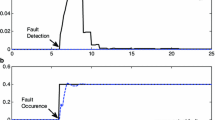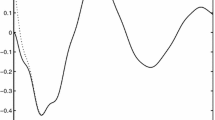Abstract
This paper presents a new approach for the design of robust H ∞ sliding mode observer (SMO) for a class of Lipschitz nonlinear systems where both faults and uncertainties are considered. A sufficient condition using linear matrix inequality (LMI) optimization is derived to guarantee the asymptotically stability of the estimation error dynamics and compute the observer gains. A fault estimation scheme is presented where the estimation signal can approximate the fault to some degree of accuracy. Our design approach has some advantages. The Lipschitz constant of the nonlinear term in the system and the disturbance attenuation level are maximized simultaneously through convex multiobjective optimization. For this reason, the Lipschitz constant is suitable to a large class of uncertain nonlinear systems. Moreover, the fault estimation is much more robust against disturbances and nonlinear uncertainty and can preserve the fault signal shape effectively. Finally, a simulation study on a robotic arm system is presented to show the effectiveness of this approach.
Similar content being viewed by others
References
R. J. Patton and R. Clark, Issues of Fault Diagnosis for Dynamics Systems, Springer, Berlin, Heidelberg, New York, 2000.
J. Chen and R. J. Patton, Robust Model-based Fault Diagnosis for Dynamics Systems, Kluwer Academic Publishers, 1999.
J. J. Gertler, Fault Detection and Diagnosis in Engineering Systems, Marcel Dekker, New York, 1998.
P. M. Frank, “Fault diagnosis in dynamics systems using analytical and knowledge-based redundancy-a survey and some new results,” Automatica, vol. 26, no. 3, pp. 459–474, 1990.
E. Y. Chow and A. S. Willsky, “Analytical redundancy and the design of robust detection systems,” IEEE Trans. on Automatic Control, vol. 43, no. 7, pp. 143–161, 1984.
R. Isermann, “Process fault detection based on modelling and estimation methods,” Automatica, vol. 20, no. 4, pp. 827–846, 1984.
C. Edwards, S. K. Spurgeon, and R. J. Patton, “Sliding mode observers for fault detection and isolation,” Automatica, vol. 36, no. 4, pp. 541–553, 2000.
C. Edwards and S. K. Spurgeon, “A sliding mode observers based FDI scheme for the ship benchmark,” European Journal of Control, vol. 6, pp. 341–356, 2000.
C. P. Tan and C. Edwards, “Sliding mode observers for detection and reconstruction of sensor faults,” Automatica, vol. 38, no. 10, pp. 1815–1821, 2002.
C. P. Tan and C. Edwards, “Sliding mode observers for robust detection and reconstruction of actuator and sensor faults,” International Journal of Robust Nonlinear Control, vol. 13, no. 5, pp. 443–463, 2003.
T. Floquet, J. P. Barbot, W. Perruquetti, and M. Djemai, “On the robust fault detection via a sliding mode disturbance observer,” International Journal of Control, vol. 77, no. 7, pp. 622–629, 2004.
E. Yaz and A. Azemi, “Sliding mode observer for nonlinear models with unbounded noise and measurement uncertainties,” Journal of Dynamics and Control, vol. 3, no. 3, pp. 217–235, 1993.
T. Floquet and J. P. Barbot, “Super twisting algorithm-based step-by-step sliding mode observers for nonlinear systems with unknown inputs,” Inter national Journal of Systems Science, vol. 38, no. 10, pp. 803–815, 2007.
X. G. Yan and C. Edwards, “Nonlinear robust fault reconstruction and estimation using a sliding mode observer,” Automatica, vol. 43, no. 9, pp. 1605–1614, 2007.
R. Raoufi, H. J. Marquez, and A. S. I. Zinober, “H ∞ sliding mode observers for uncertain nonlinear Lipschitz systems with fault estimation synthesis,” International Journal of Robust and Nonlinear control, vol. 20, no. 16, pp. 1785–1801, 2010.
A. Sellami, D. Arzelier, R. Mhiri, and J. Zrida, “A sliding mode control approach for systems subjected to a norm-bounded uncertainty,” International Journal of Robust and Nonlinear Control, vol. 17, no. 4, pp. 327–346, 2007.
C. Edwards and S. K. Spurgeon, “On the development of discontinuous observers,” International Journal of Control, vol. 59, no. 5, pp. 1221–1229, 1994.
C. Edwards and S. K. Spurgeon, Sliding Mode Control: Theory and Applications, Taylor and Francis, London, 1998.
M. Abbaszadeh and H. J. Marquez, “LMI optimization approach to robust H ∞ observer design and static feedback stabilization for discrete-time nonlinear uncertain systems,” International Journal of Robust and Nonlinear Control, vol. 19, no. 3, pp. 313–340, 2009.
V. I. Utkin, Sliding Modes in Control Optimization, Springer-verlag, Berlin, 1992.
R. Rajamani and Y. Cho, “Existence and design of observers for nonlinear systems,” International Journal of Control, vol. 69, no. 5, pp. 717–731, 1998.
P. Gahinet, A. Nemirovski, A. Laub, and M. Chilali, LMI Control Toolbox, User Guide, MathWorks, 1995.
Author information
Authors and Affiliations
Corresponding author
Additional information
Recommended by Editorial Board member Izumi Masubuchi under the direction of Editor Yoshito Ohta.
Slim Dhahri received his Master degree in Automatic Control from Higher School of Sciences and Techniques of Tunis, Tunisia (E.S.S.T.T.), in 2006. Currently, he is a research member in research unit on control, monitoring and safety of systems (C.3.S.) at E.S.S.T.T. and he is working toward a Ph.D. degree in Electrical Engineering. His research interests include sliding mode and fault detection and isolation (F.D.I.) of linear and nonlinear systems.
Anis Sellami was born in Tunisia, in 1967. He obtained his HABILITATION diploma at Sciences Faculty of Tunis, Tunisia in 2008, and his Ph.D. in Electrical Engineering at National School of Engineers of Tunis, Tunisia in 1999, and an Master in Automatic Control and a B.A. in Technical Sciences at ESSTT, Tunis, Tunisia in 1993 and 1990, respectively. From 1999 to 2008, he was an assistant professor at ESSTT. Since December 2008 he is a professor (University Lecturer) with the Electrical Engineering Department, ESSTT, Tunisia. His research interests robust control with sliding mode and photovoltaic systems.
Fayçal Ben Hmida received his B.S. in Electrical Engineering from the E.S.S.T.T., Tunisia, in 1991. In 1992, he obtained his Master degree in Automatic and Informatics at the Aix-Marseille III University, France, and a Ph.D. in Productique and Informatics at the same university in 1997. Since 1998, he joined the E.S.S.T.T at Tunis University as an Assistant Professor. Now, he is a member in research unit on C3S at E.S.S.T.T. His main research includes fault detection and isolation (FDI), robust estimation and robust filtering.
Rights and permissions
About this article
Cite this article
Dhahri, S., Sellami, A. & Hmida, F.B. Robust H ∞ sliding mode observer design for fault estimation in a class of uncertain nonlinear systems with LMI optimization approach. Int. J. Control Autom. Syst. 10, 1032–1041 (2012). https://doi.org/10.1007/s12555-012-0521-3
Received:
Revised:
Accepted:
Published:
Issue Date:
DOI: https://doi.org/10.1007/s12555-012-0521-3




